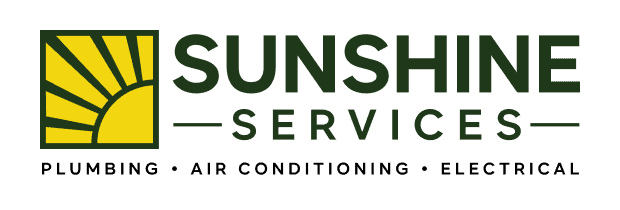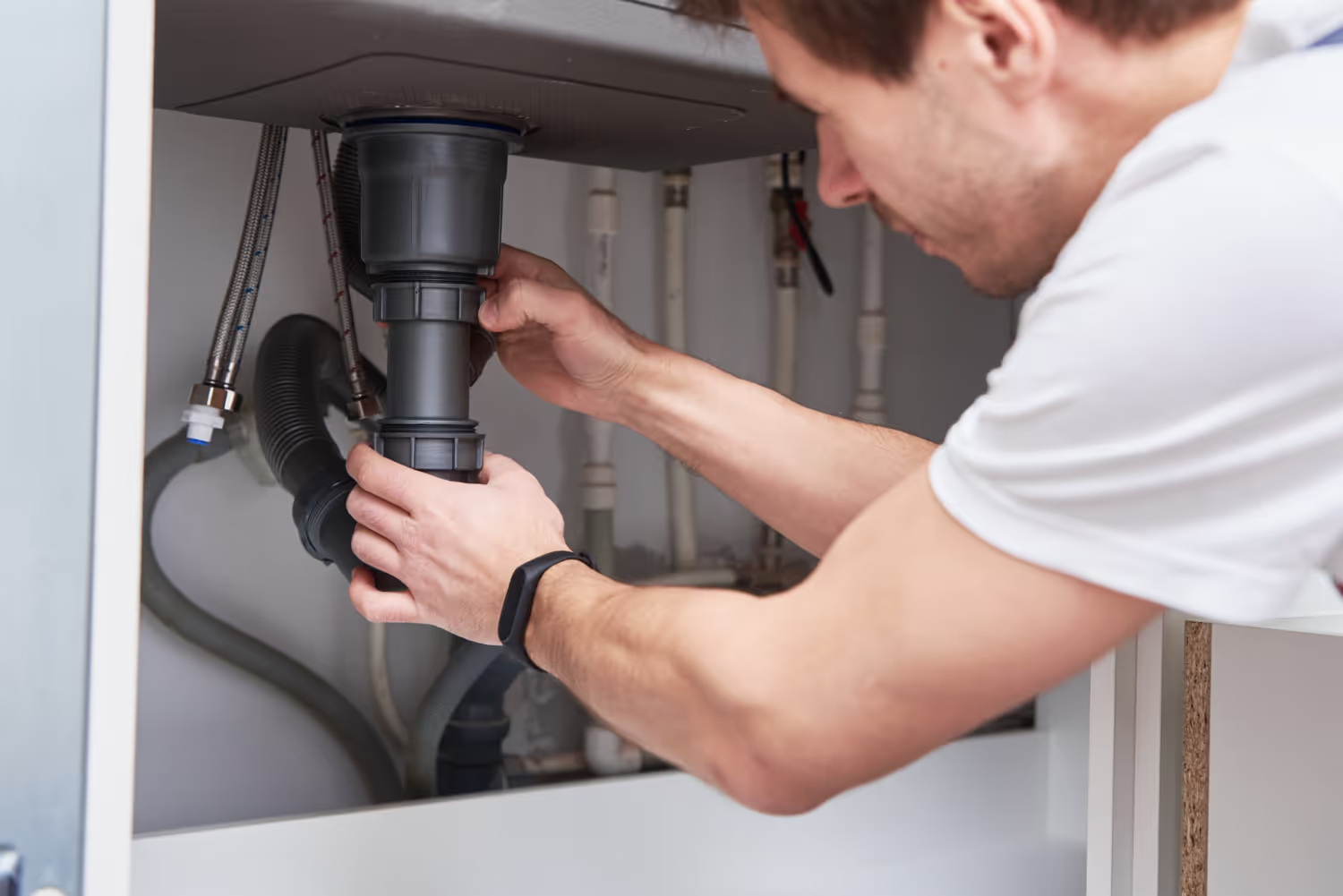


FREE Water Heater
With every whole house repipe purchase. Free brand-new water heater or credit towards a tankless water heater.
.svg)
.svg)
.svg)
.svg)



With every whole house repipe purchase. Free brand-new water heater or credit towards a tankless water heater.
.svg)
.svg)
.svg)
.svg)

Residential plumbing covers everything inside your home that moves water in and out, from the pipes behind your walls to the fixtures you use every day. Residential plumbing includes your water supply lines, drainage systems, water heaters, toilets, sinks, showers, and all the connections that make them work together.
For Gainesville homeowners, understanding what falls under residential plumbing helps you know when to call a professional and what to expect from plumbing services. Many homeowners think plumbing only means fixing leaks or unclogging drains.
However, residential plumbing involves much more complex systems that require different skills and tools than commercial work. We'll walk you through the complete plumbing system in your home and explain how it differs from commercial plumbing.
In this article, you’ll learn what residential plumbing covers, from essential systems and services to maintenance tips for homeowners in Gainesville, FL.
Here’s what you need to know:
Keep reading! Whether you're dealing with a plumbing emergency or planning home improvements, knowing what residential plumbers actually do can save you time and money.
Understanding residential plumbing systems
Residential plumbing systems bring clean water into your home and remove waste water safely. These systems include pipes, fixtures, and components that work together, but they can develop problems like clogs, leaks, and pipe bursts that need quick attention.
Residential plumbing is the network of pipes, fixtures, and appliances that supply fresh water and remove waste from your home. This system includes water supply lines, drain pipes, water heaters, and fixtures like sinks and toilets.
Your plumbing system protects your family's health by providing clean drinking water. It also removes waste water that could carry harmful bacteria.
EPA research reveals that a typical household uses over 300 gallons of water per day, and about 70% of that flows through residential plumbing fixtures like faucets, showers, toilets, and water heaters.
A working plumbing system prevents water damage to your home. When pipes leak or burst, they can cause expensive repairs to floors, walls, and foundations.
Understanding your plumbing helps you spot problems early. This knowledge can save you money on repairs and prevent emergencies.
Water supply lines bring fresh water from the city main or well into your home. These pipes are usually made of copper, PVC, or PEX materials.
The main water line connects your home to the water source. A water meter measures how much water you use.
Fixtures include sinks, toilets, showers, and bathtubs. Each fixture connects to both supply and drain lines.
Your water heater heats water for showers, washing dishes, and laundry. Most homes have tank or tankless water heaters.
Drain pipes carry waste water away from your home. These pipes connect to either a city sewer system or septic tank.
Vent pipes allow air into the drain system so water flows properly. Without vents, drains would gurgle and work poorly.
Clogs happen when hair, food, or other materials block drain pipes. Kitchen sinks often clog from grease, while bathroom drains clog from hair and soap.
Leaks can occur at pipe joints, fixture connections, or when pipes crack. Small leaks waste water and can grow into bigger problems.
EPA statistics show household leaks can waste roughly 9,400 gallons per year—highlighting the need for prompt home pipe repair to prevent unnecessary water loss and higher utility bills.
A pipe burst is a serious emergency that floods your home. Frozen pipes, old age, or high water pressure can cause pipes to burst.
Low water pressure often means mineral buildup in pipes or a leak somewhere in the system. This problem affects how well your fixtures work.
Running toilets waste water when the flapper valve doesn't seal properly. This common issue can increase your water bill significantly.
We recommend calling a plumber for pipe bursts, major leaks, or any problem you can't safely fix yourself.
Residential plumbers handle three main areas of home plumbing work. They fix broken pipes and install new fixtures, keep systems running smoothly through regular maintenance, and respond quickly to urgent plumbing problems.
We rely on residential plumbers for both fixing broken plumbing and installing new systems. These professionals handle everything from small fixes to major home upgrades.
Common repair services include:
Installation work covers new fixtures and complete system upgrades. Plumbers install toilets, sinks, garbage disposals, and dishwashers. They also handle bigger jobs like replacing old pipes throughout the house.
Water heater installation is another key service. Whether we need a traditional tank model or a tankless system, plumbers ensure proper setup and connections.
For bathroom and kitchen remodels, plumbers move existing pipes and install new ones. They work with contractors to make sure all plumbing meets local codes and works correctly.
Regular maintenance helps prevent costly plumbing problems before they start. Professional plumbers offer scheduled services to keep home plumbing systems working well.
Key maintenance services include:
Plumbers clean out drains using special tools that remove buildup we cannot reach. This prevents slow drains from turning into complete blockages.
Water heater maintenance involves checking the heating elements, flushing sediment, and testing safety features. This extends the unit's life and keeps energy costs down.
Pipe inspections catch small problems early. Plumbers look for signs of corrosion, loose joints, and worn parts that could fail later.
Many plumbers offer maintenance plans with regular visits throughout the year. These programs often include discounts on repairs and priority service.
Emergency plumbing problems need fast professional help to prevent serious damage. Residential plumbers provide 24-hour services for urgent situations that cannot wait.
Common plumbing emergencies include:
Pipe bursts cause the most damage quickly. Emergency plumbers shut off water supplies and make temporary repairs to stop flooding. They then plan permanent fixes once the immediate crisis ends.
Sewage backups create health hazards that require immediate attention. Plumbers use special equipment to clear blockages and clean contaminated areas safely.
When water heaters fail completely, emergency plumbers can often restore hot water the same day. They carry common parts and backup units for quick replacements.
Emergency plumbers charge higher rates than regular service calls. However, fast response prevents much more expensive water damage to floors, walls, and belongings.
Plumbing costs in Gainesville depend on job complexity, materials, and labor rates, with hourly services ranging from $50 to $200. Preventative maintenance helps homeowners avoid expensive emergency repairs and extends system lifespan.
Several key factors determine what you'll pay for plumbing services in Gainesville. Job complexity plays the biggest role in pricing.
Simple repairs like fixing a leaky faucet cost much less than replacing a sewer line. Emergency calls typically cost 50% more than regular appointments.
Materials and parts directly impact your final bill. High-quality fixtures and pipes cost more upfront but last longer. Your plumber may mark up materials by 10-30%.
Labor rates vary based on the plumber's experience and certifications. Licensed residential plumber Gainesville professionals charge more than unlicensed workers.
Location and accessibility affect costs too. Hard-to-reach pipes or areas requiring special equipment increase labor time. Jobs requiring permits add extra fees.
Time of service matters significantly. Weekend and holiday calls cost more than weekday appointments. Late-night emergencies carry the highest premiums.
Understanding typical costs helps you budget for plumbing needs. Most plumbers charge either hourly rates or flat fees for common services.
Hourly rates in Gainesville range from $75 to $150 for standard work. Emergency services can reach $200 per hour.
Here are common service costs:
Service Type
Price Range
Drain cleaning
$100-$300
Toilet repair
$150-$400
Faucet installation
$200-$500
Water heater repair
$300-$600
Pipe replacement
$400-$1,500
Minor repairs like unclogging drains or fixing running toilets typically cost $100-$300. These jobs usually take 1-2 hours.
Major repairs such as sewer line replacement can cost $2,000-$5,000. Complex installations require multiple visits and specialized equipment.
Many Gainesville plumbers offer flat-rate pricing for common tasks. This approach helps you know exact costs upfront without surprises.
Regular maintenance prevents costly emergency repairs and extends your plumbing system's life. We recommend annual inspections to catch problems early.
Annual maintenance costs $150-$300 but can save thousands in major repairs. Early detection of leaks prevents water damage and mold growth.
Drain cleaning every 1-2 years prevents major blockages. This service costs $100-$200 but avoids $500+ emergency calls.
Water heater maintenance includes flushing sediment and checking components. This $100-$150 service extends unit life by 3-5 years.
Pipe inspections using cameras identify problems before they cause failures. Spending $200-$400 on inspection beats paying $3,000+ for emergency sewer repairs.
Preventative maintenance also helps maintain warranty coverage on fixtures and appliances. Many manufacturers require regular service to honor warranties.
Well-maintained systems use water more efficiently, reducing utility bills. Clean pipes and properly adjusted fixtures can cut water costs by 10-15%.
Residential plumbing systems serve individual homes and families, while commercial plumbing handles larger buildings with more complex needs. The scale, materials, and maintenance requirements differ significantly between these two types of plumbing work.
Residential plumbing systems are built for single-family homes or small buildings. We typically see simpler designs with fewer pipes and connections.
Home plumbing systems include:
Commercial plumbing serves office buildings, shopping centers, and hotels. These systems must handle much higher water usage and more people.
Commercial systems feature:
The pipe materials also differ. Homes use cost-effective options that work well for family needs. Commercial buildings need heavy-duty materials that can handle constant use.
Commercial systems require more planning and engineering. They must meet stricter building codes and safety requirements.
Residential plumbers focus on problems that homeowners face every day. We handle common issues like clogged drains, leaky faucets, and broken water heaters.
Home plumbing work is usually smaller in scope. Jobs can often be completed in a few hours or days. This allows for quicker turnaround times.
Common residential services:
Residential specialists understand home layouts and family needs. They know which materials work best for houses and apartments.
The tools and equipment are different too. Home plumbers use smaller tools that fit in tight spaces. They work around furniture and family schedules.
Commercial work requires different skills and certifications. The systems are more complex and need specialized training.
Choose a residential plumber for any home plumbing issue. This includes repairs, installations, and maintenance in houses or small apartment buildings.
Call residential plumbers for:
Commercial specialists handle large buildings and businesses. They work on systems that serve many people at once.
Commercial plumbers handle:
The licensing and insurance requirements differ between the two. Commercial plumbers need additional certifications for larger projects.
Check the plumber's experience with your type of property. A residential specialist knows home systems best. They can fix problems faster and more effectively than someone who mainly works on commercial buildings.
Regular maintenance keeps your plumbing working properly and prevents costly repairs. Simple daily habits, seasonal care, and knowing when to call professionals will protect your home's pipes and fixtures.
We can prevent most plumbing problems with basic daily and weekly habits. These simple steps protect our pipes and save money on repairs.
Watch what goes down your drains. Never put grease, coffee grounds, or food scraps down kitchen sinks. Use drain screens to catch hair and soap buildup in bathroom drains.
Check water pressure regularly. High pressure damages pipes and fixtures over time. We should test pressure with a gauge and adjust if it's above 80 psi.
Run water in unused fixtures weekly. This prevents trap seals from drying out and keeps harmful sewer gases from entering our homes.
Fix small leaks immediately. A dripping faucet or running toilet wastes water and can lead to bigger problems. Most minor leaks are easy DIY fixes.
Know where your main water shutoff is located. Mark it clearly so we can turn off water quickly during emergencies.
Each season brings different challenges for our plumbing systems. We need to adjust our maintenance routine based on weather changes and usage patterns.
Winter protection is critical in Gainesville. Even our mild winters can cause pipe damage during cold snaps. We should disconnect garden hoses and cover outdoor faucets when temperatures drop below freezing.
Spring inspections catch winter damage early. Check exposed pipes for cracks or loose joints after cold weather passes. Look for signs of leaks around water heaters and under sinks.
Summer brings heavy usage. We use more water during hot months, which can stress our systems. Clean out gutters and check that outdoor drainage works properly before heavy rains.
Fall preparation prevents problems. Clear leaves from gutters and drains. Test our water heater before we need it most during cooler months.
Some plumbing issues require professional skills and tools. We should call experts when problems are beyond basic DIY fixes or involve major systems.
Call professionals for persistent clogs. If plunging and drain cleaners don't work, we likely have serious blockages that need professional equipment to clear safely.
Water heater problems need expert attention. Strange noises, rusty water, or temperature issues often mean internal damage that requires professional diagnosis and repair.
Low water pressure throughout the house indicates bigger issues. This could mean pipe corrosion, hidden leaks, or problems with the main water line.
Sewer line backups are emergencies. Multiple drains backing up at once or sewage smells require immediate professional help to prevent health hazards and property damage.
Annual inspections catch problems early. Professional plumbers can spot issues we might miss and perform maintenance on complex systems like sump pumps and main lines.
Residential plumbing systems protect your Gainesville home's water quality and safety. We covered the main parts like supply lines, drainage, and fixtures that work together every day.
Regular maintenance prevents costly repairs. Simple tasks like checking for leaks and cleaning drains make a big difference. Professional inspections catch problems before they grow.
Emergency plumbing issues happen without warning. Having a trusted local plumber's contact information saves time and stress when pipes burst or water heaters fail.
Licensed Gainesville plumbers handle complex repairs safely. They understand local codes and have the right tools for permanent fixes. DIY work is fine for minor clogs, but leave major repairs to experts.
Water pressure, temperature, and quality affect daily comfort. Modern plumbing systems deliver clean water efficiently when properly maintained.
Smart homeowners invest in their plumbing systems. Quality fixtures last longer and use less water. Professional installation ensures everything works correctly from the start.
Your home's plumbing network is more complex than it appears. Understanding the basics helps you make informed decisions about repairs, upgrades, and maintenance schedules.
Schedule expert residential plumbing services in Gainesville today to ensure your home’s pipes, fixtures, and water systems stay in top condition.